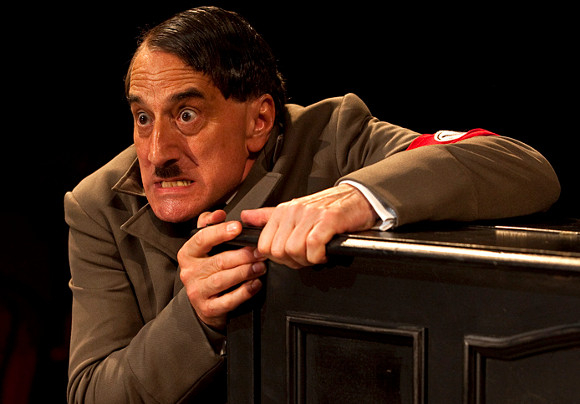Michael Coveney: Bard behaviour with Brechtian rap in Chicago

Our London theatre has umbilical connections with New York, but there's a lot of Shakespeare going off in Chicago at the moment, with the arrival at the Duchess of Henry Goodman as Arturo Ui, a Scarface-style Chicago gangster (from Brooklyn!) with Richard III tendencies (and a touch of Macbeth: "Is this a luger that I see before me?"), and the astonishing Chicago Shakespeare Theatre's Othello: The Remix currently knocking 'em dead at the Unicorn, the UK's top theatre, arguably, for young audiences.
Chicago itself has long been a wonderful theatre city, with its Goodman Theatre doing the classics and the Second City cabaret venue launching so many of today's top American comedians. There was even once a superb international festival I visited when the city hosted our own National Theatre – Ian McKellen led the troupe onstage in The Duchess of Malfi and a Stoppard and Sheridan double bill (The Real Inspector Hound and The Critic) and offstage to Wrigley Park for the baseball game.
Although Brecht never went to Chicago himself, any more than Shakespeare went to Venice or Padua, he set several of his plays there, not only Ui, but also St Joan of the Stockyards (the financier and mogul Pierpont Morgan was his villanous model for Pierpont Mauler) and – currently revived with great flair at the Arcola in Dalston – In the Jungle of Cities.
Jungle pre-dates Ui and prefigures it, too, in its picture of criminal corruption, a humming theatrical metaphor in what Brecht already saw as a system of capitalism ripe for Marxian analysis, a picture he derived from potboiler novels and the gangster movies he loved.
Ui is palpably Hitler according to James Cagney, whereas George Garga, brilliantly played at the Arcola by Joseph Arkley (and, at one point in a dress: Lady Garga?), is the apprentice, the blank page on which Jeffery Kissoon's demonic Malayan lumber merchant Shlink paints his own ghastly portrait. I love In the Jungle of Cities – it was the third play I ever reviewed, the inaugural production of the Half Moon Theatre in Alie Street in the East End many moons ago – and I've always been fascinated by it.
In fact, as I was saying to David Aukin in the interval at Ui last night, there was a time when all of Brecht's early plays, and most of the masterpieces, too, came round as regularly as clockwork. Now, they're all comparative rarities. Even I was taken by surprise at the sweep and scenic construction of Arturo Ui last night; plays like that just aren't written any more, alas.
And seeing it the night after Stephen Unwin's revival of Ghosts at the Rose in Kingston reaffirms one important function of classic revivals: to remind our theatre to think deeper and aim higher all the time, to write theatre, not just dialogue in a room between people sitting on furniture, and to address a world both within and beyond the audience.
The Chicago Shakespeare Theatre is certainly doing that, on a modest scale, with their hip-hop rapping version of Othello, adopting the low common denominator of that cultural template, if you like, but creating a genuinely thrilling construct of words, rhythm and music, and none of it Shakespeare's beyond a close adherence to his plot; I spotted only one familiar phrase in the whole eighty-minute performance, that of "making the beast with two backs," newly assigned by Iago to Roderigo's fantasy of winning Desdemona ahead of the Moor.
The National Theatre's current Othello is set in a British army camp in either Afghanistan or Iraq; the Chicago Othello sends the hero not on foreign assignment but on a nationwide music tour, promoting his new album, fighting off rivals, encouraging Cassius (until the bubble bursts) and answering to the doge of Venice, or rather the head of the record label company, a tennis-loving freak in shades and sweat bandanna called Loco Vito.
The only thing about the endless rapping is that there's not enough variety in the numbers or the idiom, but the four actors – Desdemona wafts over the show as a disembodied siren – and the sound deck DJ are so brilliant and resourceful you don't really mind; the kids I saw it with from schools all over London certainly didn't. They went wild.
The highlights are Iago's re-written credo (from Verdi's opera) as "I am the puppet master" and a Motown rap "It's a man's world (but he be nothing)" done by the quartet in coloured wigs and shimmying gestures. All the main characters – Brabantio, Bianca, Emilia included – are done as lucidly executed quick change turns, and there's a definite sense of Shakespeare throughout, and of Shakespeare as performed in a foreign language throwing fresh light on the original.
Similarly, you could say that Arturo Ui is a radically re-imagined version of Richard III – with Faust and Macbeth thrown in, fully absorbed and thrown over for good measure. And this is just how it should be, how theatre thrives, grows and develops. And, for heaven’s sake, finds new audiences.










